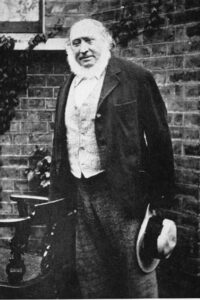
Lorna Doone, A Romance of Exmoor
If anybody cares to read a simple tale told simply, I, John Ridd, of the parish of Oare, in the county of Somerset, yeoman and churchwarden, have seen and had a share in some doings of this neighborhood, which I will try to set down in order, God sparing my life and memory. And they who light upon this book should bear in mind not only that I write for the clearing of our parish from ill fame and calumny, but also a thing which will, I trow, appear too often in it, to wit—that I am nothing more than a plain unlettered man, not read in foreign languages, as a gentleman might be, nor gifted with long words (even in mine own tongue), save what I may have won from the Bible or Master William Shakespeare, whom, in the face of common opinion, I do value highly. In short, I am an ignoramus, but pretty well for a yeoman.
My father being of good substance, at least as we reckon in Exmoor, and seized in his own right, from many generations, of one, and that the best and largest, of the three farms into which our parish is divided (or rather the cultured part thereof), he John Ridd, the elder, churchwarden, and overseer, being a great admirer of learning, and well able to write his name, sent me his only son to be schooled at Tiverton, in the county of Devon. For the chief boast of that ancient town (next to its woollen staple) is a worthy grammar school, the largest in the west of England, founded and handsomely endowed in the year 1604 by Master Peter Blundell, of that same place, clothier.
Here, by the time I was twelve years old, I had risen into the upper school and could make bold with Eutropius and Caesar—by the aid of an English version—and as much as six lines of Ovid. Some even said that I might, before manhood, rise almost to the third form, being of a persevering nature; albeit, by full consent of all (except my mother), thick-headed. But that would have been, as I now perceive, an ambition beyond a farmer’s son; for there is but one form above it, and that made of masterful scholars, entitled rightly ‘monitors’. So it came to pass, by the grace of God, that I was called away from learning, whilst sitting at the desk of the junior first in the upper school, and beginning the Greek verb [Greek word].
My eldest grandson makes bold to say that I could never have learned [Greek word], ten pages further on, being all he could manage, with plenty of stripes to help him. I know that he hath more head than I—though never will he have such body; and am thankful to have stopped betimes, with a meek and wholesome head-piece.
But if you doubt of my having been there, because now I know so little, go and see my name, ‘John Ridd,’ graven on that very form. Forsooth, from the time I was strong enough to open a knife and to spell my name, I began to grave it in the oak, first of the block whereon I sate, and then of the desk in front of it, according as I was promoted from one to other of them: and there my grandson reads it now, at this present time of writing, and hath fought a boy for scoffing at it—’ John Ridd his name’—and done again in ‘winkeys,’ a mischievous but cheerful device, in which we took great pleasure.
This is the manner of a ‘winkey,’ which I here set down, lest child of mine, or grandchild, dare to make one on my premises; if he does, I shall know the mark at once, and score it well upon him. The scholar obtains, by prayer or price, a handful of saltpeter, and then with the knife wherewith he should rather be trying to mend his pens, what does he do but scoop a hole where the desk is some three inches thick? This hole should be left with the middle exalted, and the circumfere dug more deeply. Then let him fill it with saltpeter, all save a little space in the midst, where the boss of the wood is. Upon that boss (and it will be the better if a splinter of timber rises upward) he sticks the end of his candle of tallow, or ‘rat’s tail,’ as we called it, kindled and burning smoothly. Anon, as he reads by that light his lesson, lifting his eyes now and then it may be, the fire of candle lays hold of the petre with a spluttering noise and a leaping.
Read or download Book
R. D. Blackmore
Richard Doddridge Blackmore (7 June 1825 – 20 January 1900), known as R. D. Blackmore, was one of the most famous English novelists of the second half of the nineteenth century. He won acclaim for vivid descriptions and personification of the countryside, sharing with Thomas Hardy a Western England background and a strong sense of regional setting in his works.
Blackmore, often referred to as the “Last Victorian”, was a pioneer of the movement in fiction that continued with Robert Louis Stevenson and others. He has been described as “proud, shy, reticent, strong-willed, sweet-tempered, and self-centered.” Apart from his novel Lorna Doone, which has enjoyed continuing popularity, his work has gone out of print.
Biography
Richard Doddridge Blackmore was born on 7 June 1825 at Longworth in Berkshire (now Oxfordshire), one year after his elder brother Henry (1824–1875), where his father, John Blackmore, was Curate-in-charge of the parish. His mother died a few months after his birth – the victim of an outbreak of typhus that had occurred in the village. After this loss John Blackmore moved to Bushey, Herts, then to his native Devon, first to Kings Nympton, then Culmstock, Tor Mohun, and later to Ashford, in the same county. Richard, however, was taken by his aunt, Mary Frances Knight, and after her marriage to the Rev. Richard Gordon, moved with her to Elsfield Rectory, near Oxford. His father married again in 1831, whereupon Richard returned to live with him. Having spent much of his childhood in the lush and pastoral “Doone Country” of Exmoor, and along the Badgworthy Water (where there is now a memorial stone in Blackmore’s honor), Blackmore came to love the very countryside he immortalized in Lorna Doone.
Scholarly career
In 1837, Blackmore entered Blundell’s School in Tiverton. He excelled in classical studies and later won a scholarship to Exeter College, Oxford, where he took his degree in 1847. During a university vacation, he made his first attempt at writing a novel. This was the beginning of The Maid of Sker – not completed until many years later, and eventually published in 1872 – which he would come to consider his finest novel.
After leaving Oxford and spending some time as a private tutor, Blackmore decided on a career in law. He entered the Middle Temple in 1849 and was called to the Bar in 1852. Ill health, however, prevented him from continuing legal work as a full-time occupation, and in 1854, he took the post of classics master at Wellesley House Grammar School, Hampton Road, Twickenham. In later years this became the Metropolitan and City of London Police Orphanage and then Fortescue House School. Soon after accepting this position, he moved from London to No. 25 Lower Teddington Road, Hampton Wick – where he lived until he moved to his new home in Teddington.
Marriage
Blackmore was married on 8 November 1853 at Trinity Church, Holborn to Lucy Maguire. She was 26, a Roman Catholic, and somewhat delicate, which is assumed to be the reason that they never had any children. They were both fond of her sister Agnes’ four children and often had them to stay. As well as helping with their education, the Blackmores seem to have adopted Eva when she was 7. Theirs was described by Blackmore’s sister as a “happy marriage.”






